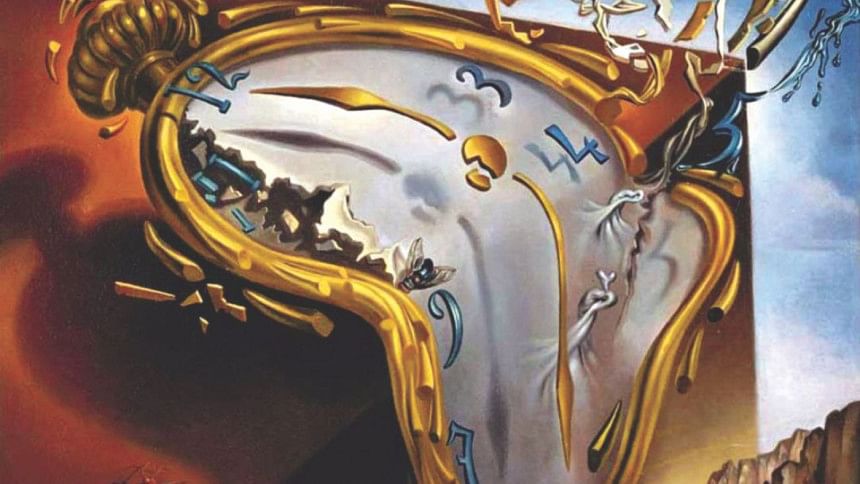Time to take a pause

Forgive me, dear readers, for this rather unconventional column—about "nothingness"! Of late, I am increasingly enjoying the leisure of doing simply nothing. The sensational daily newspaper headlines, the racy TV commentaries on the downhill plunge of US politics, the friendly bridge games with neighbours, even one and one lunches with close friends—seem to have lost their allure. Often, I find myself making last minute calls regretting invites and cancelling engagements, preferring to do nothing. (Thankfully, a retired life provides me the escape from the daily grind).
This self-imposed reclusive phase was triggered by a simple episode. I was rushing to a Tai Chi class on a busy Tuesday that was already filled with a morning dentist appointment and an afternoon meeting with my book club (the book was half finished). Noticing my stressed out expression, my husband asked: "Why are you going to Tai Chi?" "To relax," I blurted out. "Why go to the class to relax, why not unwind on the patio for half an hour simply enjoying the gorgeous day? Don't push yourself to do things that you think might relax you." I realised the wisdom of these words. And chose to spend some time simply gazing at the blue sky. These inactive moments could be considered as an utter waste of time. They were not part of a schedule or timetable; they were a chronological anomaly. But they are stuck in my mind as some of the most memorable of the past few weeks.
Please don't misunderstand my intentions—I am neither promoting laziness nor advocating a hedonistic outlook to life. Although I believe in a strong work ethic, I have come to realise that these rare moments of nothingness contribute to happiness and tranquillity. Perhaps I need to elaborate on my point of view. Like most of my generation, I was brought up to believe that work is virtuous. Hence, in my youth, I filled my days pursuing worthwhile activities—something, anything with a purpose. Even conversations had to be full of vigour and without pauses. In my short stint as a teacher, I was afraid of the odd question from a student that might push me into silence—for a lack of fluency was equated with a lack of knowledge. Heaven forbid if people should think I have "nothing to say"! But the truth is, these days I frequently find myself in situations where I have "nothing to add" to social conversations. I especially tune out of long-winded accounts of extraordinary feats by friends' children and inane chatter about holiday trips spent in five star luxury. Isn't there already a surfeit of that on Facebook?
Having reached the outskirts of old age, I have realised that pointless hours have been spent trying to "do" what I thought was required of me. In the process I missed out on many enriching experiences. Films or plays that I should have seen, books that I should have read, places that I should have visited, sick relatives and friends that I should have spent time with. Can I catch up on all that I missed? Perhaps not. But I have learnt a valuable lesson—that time need not always be measured by the utility it yields. While I admire those who are "doing" great things—creating music, writing stories and developing new computer apps—I was not meant for great things. Hence, time has a different dimension and meaning for me! And it's worthwhile to enjoy the purposeless moments of solitude. This doesn't mean that my mind dwells in a vacuum. It just means taking time off from the internet, social gatherings and routine tasks to connect with my memories, desires, regrets, recriminations, awareness of mortality and so on. "Time for visions and revisions," as TS Eliot's Prufrock put it.
The truth is that taking a break from the routine activities frees our mind to perceive the sights and sounds that are often hidden by the noises in the system. Thank God that Rabindranath Tagore was not fixated on "doing". He often paused to experience the mysteries of nature by connecting with them rather than glossing over them as a mere spectator. The chant of the birds, the rustle of the breeze and the silence of the sky created an indelible impression on him. These contemplative interludes produced the most beautiful poetry and music. Unfortunately, for ordinary people like me a mundane physical activity like listening to the chirping of the cicadas does not yield metaphysical outcomes. But it does have a profound effect on my being since it helps me align myself to the rhythm and beauty of our world. And that is why I think it's worth taking a break from all the routine tasks and doing "nothing". It may not be a state that one can sustain, but it's something that one must try once in a while to discover "in broad daylight, Streams full of stars, like skies at night."
Milia Ali is a renowned Rabindra Sangeet exponent and a former employee of the World Bank.





Comments